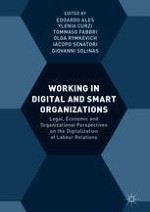2018 | OriginalPaper | Chapter
6. Assessment by Feedback in the On-demand Era
Author : Alessandra Ingrao
Published in: Working in Digital and Smart Organizations
Publisher: Springer International Publishing
Activate our intelligent search to find suitable subject content or patents.
Select sections of text to find matching patents with Artificial Intelligence. powered by
Select sections of text to find additional relevant content using AI-assisted search. powered by
